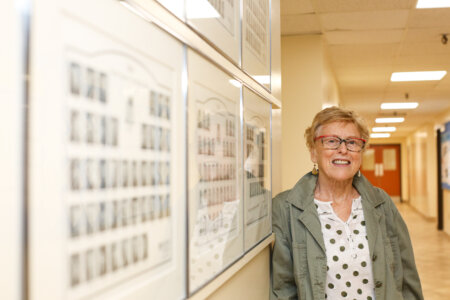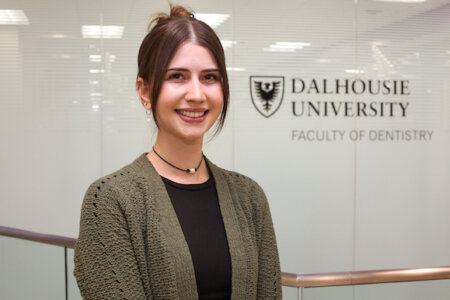
Posted: November 6, 2023
By: Kenneth Conrad
For Giving Power
When Glenda Butt (DDH’69) was director of the Faculty of Dentistry’s School of Dental Hygiene from 1994 to 2007, she made a pact with herself that she could not retire until a bachelor of dental hygiene program was available at ±«Óătv University.
Despite delays and disappointments, the program accepted its first students in 2007. Now Butt is supporting the program and its students in a different way: through the Glenda M. Butt Bursary in Dental Hygiene for students entering the bachelor of dental hygiene program.
Butt explains that she was inspired by the Kate MacDonald Bursary Fund, which was created in honour of her great friend and mentor Kate MacDonald (MEd’77), director of the School of Dental Hygiene from 1969 to 1982.
“I always thought creating a bursary was a good idea and I often promoted Kate’s,” says Butt. “When I thought about putting money into a bursary fund myself, I really wanted it to support the direction I had worked so hard to achieve.”
Perseverance and persuasion were key
“Enthusiastic and persistent are the two words people come up with to describe me,” says Butt.
Both qualities were necessary during her efforts to make a bachelor of dental hygiene program available at ±«Óătv – a process that began in the 1980s. While ±«Óătv’s Senate approved the program that Butt and her colleagues built, a five-year provincial moratorium on new health programs brought the process to a halt.

Glenda Butt (DDH’69)
During the long wait for the moratorium to end, Butt succeeded in getting a degree completion program approved for ±«Óătv dental hygiene students, enabling them to gain the additional credits needed to obtain a bachelor of science.
After that, it was a game of perseverance and persuasion to update the bachelor of dental hygiene program when the provincial moratorium ended.
“It was a struggle, and not everybody could understand why the degree was important, but we believed that it was the way of the future” says Butt. “With college programs across the country affiliating with university programs that would grant degrees, we were going to look like we were lagging behind if we didn’t do it.”
With that objective achieved in 2007, Butt retired, content that her successor would move the program forward. She spent the next few years travelling widely and helping to care for her mother, who had moved to Nova Scotia from Newfoundland.
But the idea of creating her own bursary didn’t go away. And when Butt met Dr. Leigha Rock, the then new director of the School of Dental Hygiene, at a reunion event in the Faculty of Dentistry in 2019, she “knew in five minutes that it was going to work”. Rock was “approachable and dynamic and she had an interest in research, which I thought boded well for the BDH program,” says Butt.
A shared vision
In the process of working with ±«Óătv’s Advancement Office to set up the bursary, Butt met with Rock to discuss her plans for the future of the School of Dental Hygiene. And she could not have been more pleased.
“I learned that not only is [Rock] supportive of the degree program, but she’s also actually working on creating a master’s in dental hygiene,” says Butt. “I was over the moon, and that really nailed it.”
“I have so much respect for Glenda’s vision and her legacy,” says Rock, who shares Butt’s belief in elevating the profession through more knowledge and credibility.
Support needed for dental hygiene
This past spring, the inaugural Glenda M. Butt Bursary in Dental Hygiene was presented to Lindsey Cavanagh (DDH’22, BDH’23), a student from Aylesford Lake, Nova Scotia. Cavanagh says she was grateful to receive it as it helped her complete her studies and reduce financial stress.

Lindsey Cavanagh (DDH’22, BDH’23), recipient of the inaugural Glenda M. Butt Bursary
“The bursary made me feel really supported by the school,” says Cavanagh. “I’m really happy this opportunity was there to help me focus on my schooling.”
Cavanagh had studied science for two years at Acadia University before deciding to pursue the diploma in dental hygiene at ±«Óătv. As she neared the end of the program, she realized she still wanted to earn a degree. “I felt it would open more doors for me, particularly teaching,” she says, adding that she can also see herself pursuing a master’s in education or public health further down the road.
Like Cavanagh, Rock is also grateful for the establishment of the Glenda M. Butt Bursary in Dental Hygiene.
“This bursary is so important because it’s the first and only bursary we have for bachelor of dental hygiene students,” she says. “Dental hygiene does not receive the same level of support that our dentistry programs do, so we need initiatives like this desperately. I hope Glenda’s bursary will inspire others to find their own way to support our dental hygiene programs.”